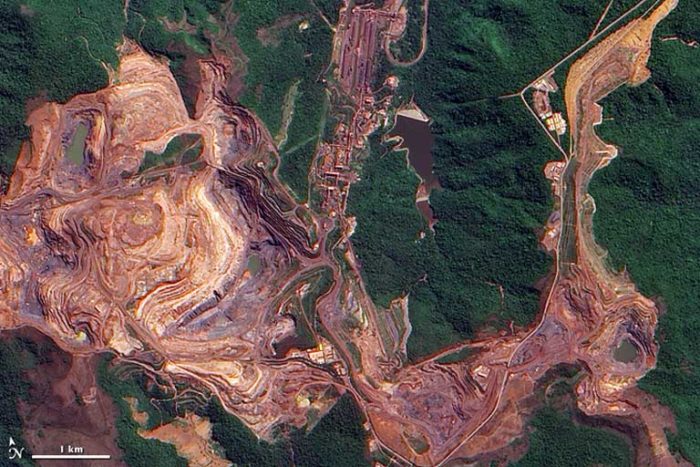
Attention to the Amazon and climate change has tended to focus on the deforestation – logging – cattle ranching – soya nexus. But of equal, perhaps greater importance is the drive by the large mining and oil companies to open up vast territories to mineral extraction. The eye-watering sums of money involved and the capital wealth of the major mining companies arguably make their power and influence greater than that of the agribusiness lobbies.
LAB editor Sue Branford has been charting some of the effects: at Autazes, in Amazonas, where Mura indigenous communities confront Canadian-owned Potássio do Brasil which aims to open a vast potash mine next to the Madeira river near Manaus. The US$2.5bn investment (with Chinese companies interested), if it goes ahead, would supply fertilizer to the soya farmers of Mato Grosso and Pará, stimulating still more deforestation. At Renca, in the northern Amazon, the potential reserves of gold, iron, phosphate, titanium, manganese, niobium and tantalum may be worth more than US$1 trillion.
These vast projects confront two obstacles: the resistance of many locals, especially indigenous people and their communities, and the tenuous protections which still exist in law and regulation. Which explains why the Bolsonaro government is so keen to alter (or in some cases ignore) the law and to disable or dismantle the regulatory agencies FUNAI, ICMBio, INPE, etc., condemning them, as Sue has shown, to ‘death by a thousand cuts’.
In this effort to seize the spoils of the Amazon basin, argues Jeffrey Hoff, it’s not (as often claimed) lawlessness that is to blame, but the laws themselves. Bolsonaro may be licensing deforestation with unprecedented zeal, but he is relying on and extending laws passed by his predecessors.
Film-maker Marcos Colón is warning of the danger of ‘a new Minamata’ (the Japanese city where hundreds of people were poisoned by mercury in 1956) caused by the release of mercury and other mining pollutants over more than 50 years in the Tapajós valley, and its accumulation in the food chain of river dwellers and Mundurukú Indians.
Indigenous victories
Indigenous communities confront what may appear to be the unstoppable power of the mining corporations and Bolsonaro government. But they are still recording some victories, as at Alta Floresta, Mato Grosso, where Munduruku people occupied the Natural History Museum and seized back 12 funeral urns and other artefacts belonging to them. These had been removed when the Teles Pires hydroelectric dam was built in 2013 and the company dynamited the sacred site at Karobixexe (Seven Rapids). Mining companies have an insatiable thirst for electric power and are enthusiastic backers of hydro-electricity.
LAB partner Agência Pública, in São Paulo, has asked LAB to translate and publish regular articles written by their network of independent journalists. The first, by Rodrígo Pedroso, describes the work of Ticuna community midwives in Tabatinga, Amazonas.
Brazil
Everyone should read the extraordinarily powerful denunciation of the Bolsonaro regime made by Glenn Greenwald and David Miranda. The almost daily death threats against them and their family have increased exponentially since Glenn and colleagues at The Intercept published damning evidence of the collusion between the Bolsonaros and militia killers and exposés of the political motivation of Sergio Moro in the LavaJato corruption scandal and the trial of Lula.
Chile
Although there has been something of a lull, during Chile’s long hot summer, mass protests are likely to revive as the Piñera government and other politicians try to forestall real citizen consultation about a new constitution. During the protests, two of the songs of legendary folk-singer Victor Jara (murdered by Pinochet’s soldiers immediately after the 1973 coup), Manifiesto and El Derecho de Vivir en Paz have become anthems for equality campaigners in Chile and around the world. Worryingly, though, Jara’s tomb was defaced by a right-wing group. The shocking brutality of Chile’s Carabineros police is documented in 45 photos in an article in The Independent.
Migration
LAB partner OjosIlegales, based in Venezuela, has made a moving video about Central American migrants in the US: I’m Here to Stay. OjosIlegales will also be helping LAB’s work on mining, documenting the devastation caused by the Arco Minero del Orinoco, and making a fund-raising video for LAB’s project.
Argentina
Peronism is back – that sprawling mixture of populist movement and ideology, of progress and reaction, which has bewitched and bedevilled the country’s political life for almost 80 years. For the time being, at least, the rift between the Kirchnerites and the party mainstream has been healed and all eyes turn to the economy – where Macri failed. Will Alberto and Cristina be able to repeat the miracle which saved the country from economic meltdown in 2003?
Neo-liberalism: ailing or moribund?
Are Macri’s failure and Piñera’s difficulties temporary, or signs of a critical weakness in the new right-wing regimes of the continent: the absence of a coherent economic project to replace the failing litanies of neo-liberalism? If the latter, then is the Bolsonaro regime also doomed?
Bolivia
Bolivia’s judiciary have scarcely distinguished themselves in recent years, except for their servility to the political power of the moment, argues Sergio Mendoza, as the interim government of Jeanine Añez ramps up prosecutions of ministers and officials of the previous government of Evo Morales. With new elections now deferred until May, much turns on what Morales’ MAS party will do. Bolivia Information Forum provides a detailed analysis of the prospects.
Best wishes to all
The LAB Team
